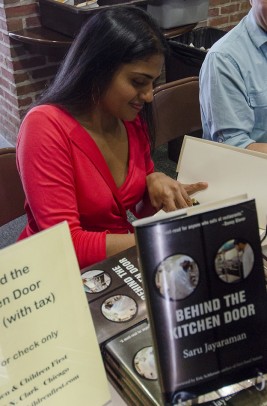Slim wages for food workers

Saru Jayaraman signs copies of “Behind the Kitchen Door.” Proceeds from the book benefit Restaurant Opportunities Centers United, she told the audience. Photo: Roberta Dupuis-Devlin/UIC Photo Services
The restaurant workers who put food on your table can’t afford to put food on their own tables.
Servers, bussers, kitchen workers and dishwashers must rely on food stamps to feed themselves, says Saru Jayaraman.
Co-director of the Restaurant Opportunities Centers United, Jayaraman gave a talk in the Chancellor’s Lecture Series Tuesday in an appropriate venue — the “Re-Thinking Soup” program in the Residents’ Dining Hall of Jane Addams Hull-House Museum.
She noted that the federal minimum wage for tipped workers is $2.13 an hour.
“The National Restaurant Association — we call it ‘the other NRA’ — says these people are younger, working their way up to something better,” said Jayaraman, director of the Food Labor Research Center at University of California, Berkeley.
“But less than 40 percent of restaurant workers are under 24.”
As a New Yorker, Jayaraman said, she ate out three times a day and “can’t remember a single person who touched my food.”
But when 73 workers locked into a restaurant at the top of the World Trade Center died on 9/11, the survivors “asked us to start something,” she said. “We were overwhelmed with calls for help.”
Now her organization has 10,000 members in 25 cities — including employers who ask, “How can we do it right?”
Restaurant Opportunities Centers United now operates two restaurants, in New York and Detroit, and plans to open one in New Orleans.
“We provide training to low-wage workers to move up to better jobs, and do a ton of research and policy work,” Jayaraman said.
As someone who ate out often, “I knew I should tip well, but I had no idea the minimum wage had been stuck at $2.13 for 22 years,” she said.
The National Restaurant Association, headed by former Republican presidential candidate Herman Cain, “is lobbying Congress to keep it frozen forever,” she said.
In addition, 90 percent of restaurant workers receive no paid sick leave, “so many are ill while they’re serving your food,” Jayaraman said.
She called on everyone who eats out to do three things:
• Buy her new book, Behind the Kitchen Door, with proceeds going to her organization.
“We’re trying for the best-seller list, to raise the issue to the national level,” said Jayaraman, who is on a 30-city tour promoting the book.
• Because a proposed law has just been introduced in Congress that would boost the $2.13 minimum wage to 70 percent of the regular $7.25 minimum, urge legislators to pass it.
• “Speak up every time you eat out,” she said. “Tell managers, ‘I love the food, but I’d love to see you pay a decent wage and give paid sick days.’”
Veronica Avila, executive director of the Chicago office of Jayaraman’s group, said the city has 250,000 restaurant jobs.
“Eighty-five percent don’t get regular raises,” she said.
The minimum wage for tipped workers in Illinois is $4.95, Avila said.
